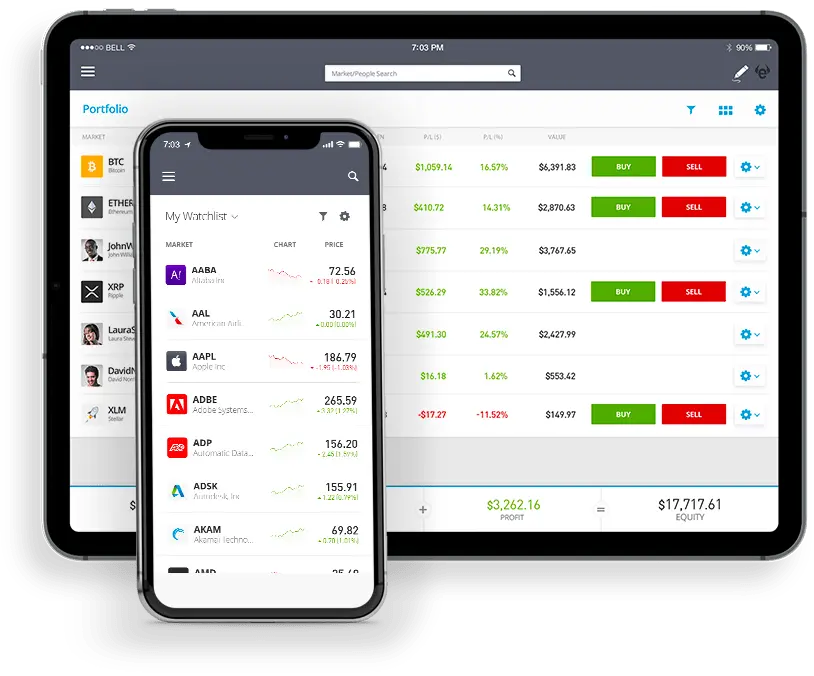
When investing in the S&P 500 (SPX500) on eToro, you'll encounter fees such as spreads, which are the difference between the buy and sell prices of the index. Additionally, holding a position overnight or over the weekend incurs small overnight or weekend fees, respectively, especially if leveraging your investment. These fees are standard for CFD trading on the platform and vary based on market conditions and your trading activities.
61% of retail investor accounts lose money when trading CFDs with this provider. You should consider whether you can afford to take the high risk of losing your money.
Having traded this index on eToro, I've become familiar with various fees and commissions associated with trading this index. In this article, I aim to share my insights on these costs, helping you understand what charges you might encounter when trading the SPX500 on eToro.
Firstly, it's crucial to know that trading the SPX500 on this eToro platform means you're dealing with index CFDs (Contracts for Difference). CFDs offer flexibility, such as leveraged trading and short selling, without owning the actual assets. However, this form of trading involves certain fees like spreads and overnight charges.
The spread is the difference between the Buy and Sell prices of the S&P 500 index. It's a common fee mechanism on platforms like eToro. The spread fee is applied when you close your position. Keep in mind that spreads can widen under certain market conditions.
For the SPX500, the lowest spread is 0.75 points, where "points" signify price changes to the left of the decimal. For instance, if the SPX500 moves from 4538.10 to 4559.05, that's a 21.50-point movement. Remember, spreads are variable and subject to market fluctuations.
Holding a CFD position on the SPX500 overnight incurs a fee relative to your position's value. This fee is akin to an interest charge for the leverage used overnight. Additionally, Weekend Fees are charged for positions held over the weekend, typically triple the overnight fee.
Rollover fees can vary with global market conditions. As of my last check, SPX500 rollover fees were $0.16938779 for Sell (Short) positions and $-1.05088999 for Buy (Long) positions, charged per night and per unit. These figures are subject to change, so I recommend checking eToro's fee pages for the latest rates. Alternatively, you can find the overnight fees in the trading window of the SPX500 asset page, located just below the "Open Trade" or "Set Order" button.
Trading the eToro S&P 500 CFD index on this platform primarily involves two types of fees: spreads and overnight/weekend fees for positions held beyond the day. Understanding these costs is crucial for anyone looking to invest in this index.
I hope this information provides clarity on the potential fees associated with trading the SPX500 on eToro, helping you make more informed investment decisions.
eToro is a multi-asset platform which offers both investing in stocks and cryptoassets, as well as trading CFDs.
Please note that CFDs are complex instruments and come with a high risk of losing money rapidly due to leverage. 61% of retail investor accounts lose money when trading CFDs with this provider. You should consider whether you understand how CFDs work, and whether you can afford to take the high risk of losing your money.
This communication is intended for information and educational purposes only and should not be considered investment advice or investment recommendation. Past performance is not an indication of future results.
Copy Trading does not amount to investment advice. The value of your investments may go up or down. Your capital is at risk.
Don’t invest unless you’re prepared to lose all the money you invest. This is a high-risk investment and you should not expect to be protected if something goes wrong. Take 2 mins to learn more.
Crypto investments are risky and may not suit retail investors; you could lose your entire investment. Understand the risks here https://etoro.tw/3PI44nZ.
eToro USA LLC does not offer CFDs and makes no representation and assumes no liability as to the accuracy or completeness of the content of this publication, which has been prepared by our partner utilizing publicly available non-entity specific information about eToro.
 About Nadav Zelver
About Nadav Zelver